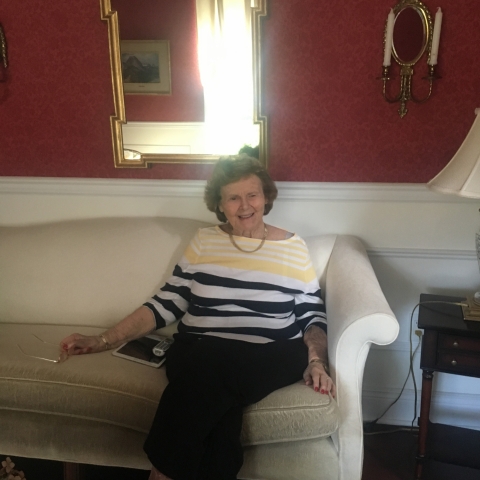 by Kevin Dicciani
by Kevin Dicciani
Despite helping to fundamentally transform New Jersey’s laws on affordable housing, Helen Kenny Motzenbecker ’50 never set out to be a hero.
“Don’t think that I headed out to be a saint — I’m no saint at all. I just got myself into it, and I didn’t seem to be able to get out of it,” Motzenbecker said.
But Motzenbecker’s actions in the mid-’80s were, upon closer examination, heroic. And yet, as she stated, she originally had no intentions of becoming a civil activist and fighting for social justice. Her plans changed, however, in July of 1967.
At that time Motzenbecker was, as she put it, a “typical housewife and mother of four,” blissfully enjoying her life. Then, on the night of July 12, civil unrest engulfed the city of Newark, New Jersey, after two white police officers beat and arrested a black cabdriver over a minor traffic violation. The events that followed, collectively known today as the Newark Riots, spanned the course of four days and claimed the lives of 26 people while injuring hundreds more.
From then on, Motzenbecker, 90, viewed the world differently.
“I was a simple, bubble-headed mother of four kids, having a good time, and then the Newark riots changed my whole life — they affected my soul,” she said. “My family had been very good to me — I was never hungry or cold or homeless — and suddenly I realized there were other people in the world who were not living like I was.”
Shortly thereafter, wanting to help in any way she could, Motzenbecker began working in Newark, looking after children of single mothers. She soon found herself wondering why the women traveled far into the suburbs to go to their jobs instead of moving closer to where they worked. One of the mothers told her there were no places nearby where she and her children could afford to live.
Searching for answers, Motzenbecker ventured to Rutgers University and read through the entirety of the Fair Housing Act of 1968. She learned after hours of research that New Jersey had designated specific zones as growth areas in which affordable housing was permitted to be built. Curious, she decided to procure a map that highlighted these zones, and once she did, she noticed these designated areas were scarce outside the city limits. To her surprise, however, she discovered that one of her properties in Bernardsville, New Jersey, a parcel of land that she had previously purchased as an investment, sat directly in the middle of an identified growth area.
Motzenbecker then approached the Borough Council of Bernardsville. Appearing in front of the council, she offered the town 50 percent of her property and proposed it use the land to develop affordable housing for low-income residents and seniors, but the council rejected her offer. One councilmember, she recalled, said he would allow “all those old people in his town over his dead body.” With that, Motzenbecker hired a law firm and sued Bernardsville for failing to provide sufficient affordable housing.
The lawsuit eventually found its way to the Supreme Court of New Jersey. Motzenbecker didn’t expect this to happen, though she was nevertheless thankful the state government was giving affordable housing the attention it deserved. But as is often the case, the lawsuit dragged on for years in the labyrinths of bureaucracy, and soon Motzenbecker’s legal fees and bills began to pile up, so much so that she was running out of money to continue litigation. Unwilling to abandon the cause, Motzenbecker mortgaged one of her two homes and ultimately sold it to remain solvent and see the lawsuit to its proper end. It was a difficult decision, yet one she knew she had to make.
“I didn’t want to spend all my money. I didn’t want to sell my house,” she said. “But I got so involved, and I cared so much about this, that I couldn’t do much else.”
The gamble paid off: Motzenbecker won the case and later reached an agreement with Bernardsville, one in which the town granted her a builder’s remedy and permission to build 15 units for affordable housing. Those units are still being lived in today, she added, and over the years they have served as a reminder to her about what can happen when one person is dedicated to generating social change.
“It’s amazing what one person can accomplish,” she said. “I was totally all by myself — there was nobody on my side, and I didn’t even know what I was doing. But one foot went after the other foot, and eventually I had a victorious day.”
Motzenbecker, who before retiring worked as the president of Pelmot Realty Corporation, said the lawsuit was “about the best thing I’ve ever done in my life.” What she fought for with courage and grit has now become, in her words, “the law of the land” in New Jersey. Little by little, most of the towns in New Jersey started converting and zoning for affordable housing, and now developers are required to reserve 20 percent of housing for low- and moderate-income residents.
Aside from being a mother, setting this legal precedent is the proudest achievement of Motzenbecker’s life.
“We’re an example for all of New Jersey that you might as well conform to the state’s rule or else you’re going to lose, and I’m the example of what happens when you lose,” she said. “It took a long time, but it’s all been very successful.”
But Motzenbecker’s willingness to confront injustice didn’t end in Bernardsville. Most recently, in 2016, she reached a settlement with the town of Spring Lake, New Jersey. She initially offered the town a unit in one of her properties so it could use it for affordable housing. The town council rebuffed her proposal, so she threatened to file litigation, claiming the town wasn’t doing enough to provide fair housing for low- and moderate-income households. In the end, the two compromised, with Motzenbecker agreeing to pay into the town’s affordable housing fund in exchange for the town rezoning her property.
Although Motzenbecker is immensely proud of both these accomplishments, one thing has never sat well with her.
“It always felt bad to me that you had to force people to be fair,” she said. “This housing isn’t free — it’s just giving people an opportunity, if they strive, to get into a good town, a good school system.”
While the Newark riots mark a distinct turning point in her life, Motzenbecker believes it was her Uncle Ed who instilled in her during her childhood “a desire to be fair and an awareness that our actions affect people who don’t even notice you are alive.”
Later, Motzenbecker discovered at Chestnut Hill College that her uncle’s lessons mirrored the teachings of the Sisters of Saint Joseph. The sisters and the faculty taught the importance of inclusivity and equality, of honesty and respect, of compassion and courage. Remove the sisters from the equation, and Motzenbecker may never have become a civil activist.
“I give Chestnut Hill College the most credit for teaching me how to think,” she said. “I learned how to think and act on principle, I learned about religion, and I loved the feeling of Chestnut Hill warmth. And the fact that they are for social justice is really wonderful as far as I’m concerned. It’s not just materialism — they are out to try to do something good in the world.”
After graduating from the College in 1950 with a bachelor’s degree in economics, Motzenbecker went on to earn her teacher’s certification from Seton Hall University. She was married to her late husband, Paul Motzenbecker, for 57 years, and together they had four children. A current resident of Spring Lake, she once served as the vice chair of the Democratic Committee in Milburn, New Jersey.
Today, Motzenbecker is still involved in real estate; in fact, she and her company are currently in the middle of new construction. She said that she looks forward to waking up each morning and overcoming any challenges her days may present. And though social justice continues to “light a big flame” in her stomach, Motzenbecker’s battles with towns are a rarity these days. Her work in that regard is, to some degree, finished.
“Now I’m just doing things for fun — I can’t fight every battle in the world,” she said. “But I’m at something all the time, and I need to have something to keep me going.”







